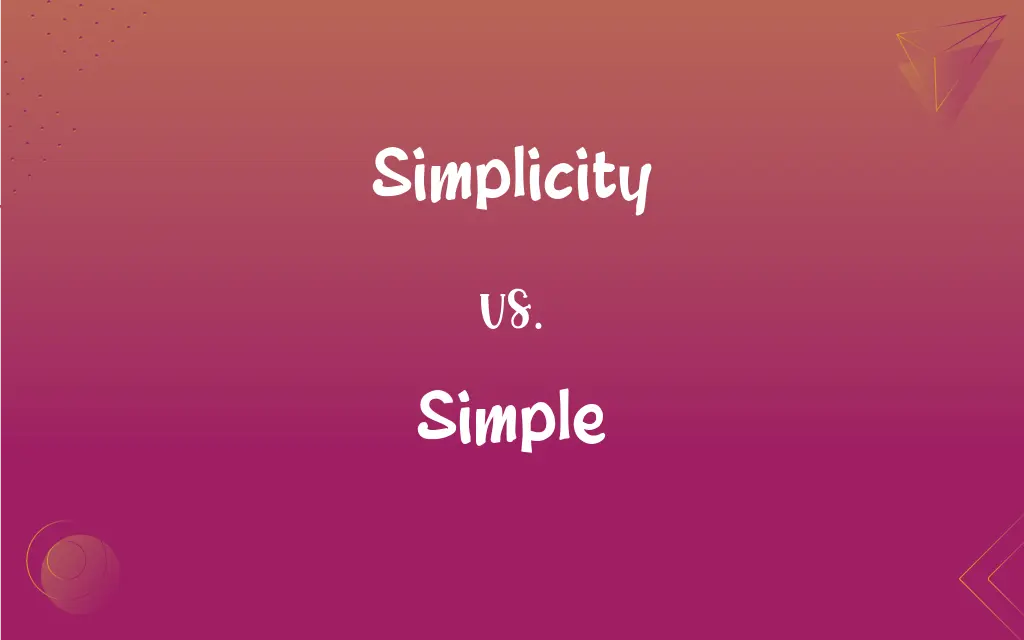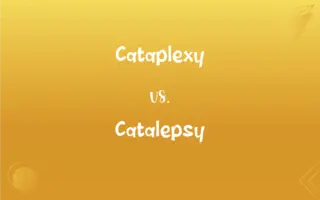Simplicity vs. Simple: What's the Difference?
Edited by Aimie Carlson || By Harlon Moss || Updated on November 6, 2023
Simplicity refers to the quality or condition of being easy to understand or do, while simple describes something that is not complicated or elaborate.

Key Differences
Simplicity is the noun form that describes the state or quality of being simple. It is often used to refer to a way of life, a design, or a concept that is uncomplicated and straightforward. Simple, an adjective, directly describes an object, task, or idea that is not complex or difficult to understand. Simplicity is an abstract concept, whereas simple is a descriptive word used for concrete items or concepts.
The concept of simplicity can imply a philosophical or aesthetic choice, valuing minimalism or clarity. It is often associated with purity and the essence of functionality, removing any superfluous elements. On the other hand, something that is simple may not necessarily be a choice but an inherent characteristic, such as a simple fact or a simple tool designed for a specific function without additional features.
Simplicity can also carry a positive connotation, suggesting elegance or serenity, such as the simplicity of a well-designed product. Meanwhile, simple can sometimes have a negative connotation, suggesting a lack of sophistication or depth, as in a simple mistake. However, in many contexts, being simple is valued for its efficiency and accessibility.
In lifestyle and philosophy, simplicity can be a goal or an ideal, as seen in movements that advocate for a simpler way of life, reducing stress and material concerns. In contrast, a simple solution or a simple choice may refer to the most straightforward path or option without implying any deeper lifestyle or philosophical significance.
While simplicity serves as a noun describing a characteristic, simple functions as an adjective that qualifies or describes. The beauty of simplicity is often celebrated in various cultural and intellectual contexts, whereas something simple is appreciated for its directness and lack of complication in everyday scenarios.
ADVERTISEMENT
Comparison Chart
Part of Speech
Noun
Adjective
Definition
The quality of being easy to understand or straightforward.
Easily understood or done; presenting no difficulty.
Usage
Refers to an abstract state or quality.
Used to describe a specific object, task, or idea.
Connotation
Often positive, can imply elegance or minimalism.
Can be positive or negative, depending on context.
Philosophical Aspect
Can represent an ideal or lifestyle choice.
Describes an inherent characteristic without philosophical implication.
ADVERTISEMENT
Simplicity and Simple Definitions
Simplicity
Freedom from complexity, intricacy, or division into parts.
The simplicity of the phone’s design made it popular among all age groups.
Simple
Without much decoration or ornamentation; unadorned.
She wore a simple dress to the ceremony.
Simplicity
An unpretentious way of life or of personal or public conduct.
Her speech was admired for its clarity and simplicity.
Simple
Easily understood or done; presenting no difficulty.
It’s a simple task that won’t take much time.
Simplicity
Absence of luxury, pretentiousness, ornament, etc.; plainness.
He chose a life of simplicity away from the corporate hustle.
Simple
Composed of a single element; not compound.
Water is a simple molecule made up of two hydrogen atoms and one oxygen atom.
Simplicity
The quality or condition of being easy to understand or uncomplicated.
The simplicity of the instructions made the game easy to play.
Simple
Plain, basic, or uncomplicated in form, nature, or design.
He preferred simple clothing without any logos.
Simplicity
The state or quality of being natural or not artificial.
They enjoyed the simplicity of rural life.
Simple
Not complex or elaborate; straightforward.
The solution was surprisingly simple.
Simplicity
The property, condition, or quality of being simple or uncombined.
Simple
Having few parts or features; not complicated or elaborate
A house with a simple floor plan.
Simplicity
Absence of luxury or showiness; plainness.
Simple
Easy to understand, do, or carry out
A simple set of instructions.
A simple chore.
FAQs
Can simplicity be applied to technology?
Yes, it can refer to user-friendly design and functionality.
Is simplicity a trend?
It can be, especially in design and lifestyle choices.
Does simplicity relate to minimalism?
Yes, it often aligns with minimalistic principles.
Is simple always a compliment?
Not always, it can imply a lack of sophistication in some contexts.
Can simple things be complex?
No, by definition, simple things are not complex.
Can simple be used to describe people?
Yes, but it should be used carefully to avoid sounding derogatory.
Does simplicity enhance productivity?
Often, yes, because it reduces unnecessary complications.
Is simplicity the same as naivety?
No, simplicity is about clarity and ease, not lack of experience or wisdom.
Can a simple object also embody simplicity?
Yes, if it’s designed to be straightforward and functional.
Can simple instructions be misunderstood?
Yes, if they are too vague or lack necessary detail.
Can businesses benefit from simplicity?
Yes, through clear communication and streamlined processes.
Does simplicity contribute to peace of mind?
Many believe that a simpler life can lead to greater peace of mind.
Does a simple lifestyle mean giving up technology?
Not necessarily, it’s about using technology mindfully.
Does a simple design mean less creativity?
No, it often requires creativity to achieve effectiveness through simplicity.
Can a problem have a simple solution and still be complex?
Yes, complex problems can sometimes have simple solutions.
Can a simple diet be healthy?
Yes, simple diets can be wholesome and nutritious.
Is the concept of simplicity subjective?
Yes, what is considered simple or simplistic can vary by individual.
Is simplicity related to purity?
It can be, as it often denotes a lack of extraneous elements.
Are simple tools less effective?
Not necessarily, they can be very effective due to their focused design.
Can simplicity be deceiving?
Occasionally, something that appears simple may have underlying complexity.
About Author
Written by
Harlon MossHarlon is a seasoned quality moderator and accomplished content writer for Difference Wiki. An alumnus of the prestigious University of California, he earned his degree in Computer Science. Leveraging his academic background, Harlon brings a meticulous and informed perspective to his work, ensuring content accuracy and excellence.
Edited by
Aimie CarlsonAimie Carlson, holding a master's degree in English literature, is a fervent English language enthusiast. She lends her writing talents to Difference Wiki, a prominent website that specializes in comparisons, offering readers insightful analyses that both captivate and inform.































































